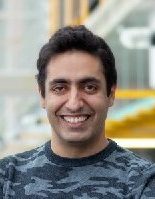Design Automation for Computer Systems
We investigate methodologies and algorithms for design of digital, mixed-signal as well as FPGA-based reconfigurable integrated circuits in context of emerging challenges of energy efficiency, security, reliability, variability and manufacturability. We look at how technology changes in devices as well as semiconductor fabrication influence design (especially layout). On the other hand, our research seeks to dramatically reduce cost of technology by utilizing design intent in technology development and process control. The effects of nanoscale semiconductor technologies span the entire hardware-software stack and as such we have been looking into architecture and system software techniques to mitigate variability and reliability challenges of increasingly unpredictable circuit fabric. Our efforts also target modeling and design of internet of things and energy systems in addition of electronic systems.
Faculty
|
|
|
|

Ankur Mehta |
Energy-Efficient Digital Architectures and Circuits
We are focusing on digital integrated circuit optimization in power-area-performance space, its application to emerging health care and communication algorithms, and the investigation of design principles with post-CMOS devices. This includes advanced communication algorithms such as those found in future cognitive radios, and increasing interest in biomedical applications.
Neuroengineering
We address challenges that limit our ability to obtain information as well as our ability to process it in incredibly small and low-power form factors, to advance technology for science, therapy and global health. Our work brings together low-power data processing, biosignal interfaces, communication, and energy aspects to push the limits of biosignal transducer systems, where the energy, size and processing requirements are often orders of magnitude more challenging than in conventional applications. The cross-disciplinary nature of our work naturally stimulates collaboration across the areas of signal processing, circuits and systems, devices, as well as interactions at the biological and engineering levels.
Communication Circuits
We develop integrated circuits for data communications spanning the entire gamut of data rates, ranges, and communication media: from wireless to wired, from PCB traces to plastic waveguides, from intra-chip to long haul links, from cellular to space communications, from VHF to Terahertz frequencies, and from low power links to multi-Gb/s links. Our focus is on CMOS electronics and our faculty are pioneers in this field. We address the fundamental challenges posed by noise, device nonlinearity, and variability in effecting communications in harsh environments. We employ rigorous theoretical analysis, creative circuit design, and algorithmic digital correction techniques to address these problems. Recent focus has been on enabling true software defined radios and mm-wave and Terahertz applications.
Faculty
Adjunct Faculty
Joint Faculty
Embedded and Mobile Computing, and Cyber-Physical Systems
We focus on foundational hardware and software technologies and architectures for computing and communication capabilities necessary for emerging embedded, mobile, and cyberphysical systems. Such systems are found in emerging application domains of critical socio-economic importance, such as robotics, mobile health, sustainable built environments, smart electrical grids, smart water networks, and transportation systems. Our research addresses the fundamental capabilities needed by these systems such as energy efficiency, real-time performance, location awareness, precise time synchronization, adaptation to variations, secure operation, etc., and also develops novel implementation methods spanning the entire system stack from application and operating system software down to the processor, datapath, memory, and I/O hardware.
Faculty
|
|
|
|
|

Ankur Mehta |
|
|
|
Sensor Information Acquisition, Processing, and Applications
Sensory information is foundational to modern electronic computing systems across myriad application domains such as health, energy, environment, and communications. Our research is developing innovative technologies for the entire waveformto-decision pathway through which sensor information flows, often in real-time, distributed and resource-constrained settings. In work, we are developing (i) high-sensitivity and low-power transducers and A/D converters for capturing and digitizing sensor signals, (ii) high-performance hardware-software platforms for processing sensor data; and (iii) efficient algorithms and protocols for processing sensor data to derive rich inferences under power, processing, and security constraints in networked settings. Moreover, the results of our research are being applied to real systems in various applications.
Human-Machine Interfaces
We believe the ultimate goal of inventing the computer is to augment our human selves. To achieve this, our research focuses on the following three topics:
- Intelligent User Interfaces: How can we design interfaces of intelligent systems that augment a user is to accomplish domain-specific tasks?
- Sensing & Interaction Techniques: How can we invent new sensors and devices that afford novel experiences for users to interact with a computer?
- Computational Design & Fabrication: How can we build computational platforms that empower users to realize their ideas into digital or physical artifacts?
































